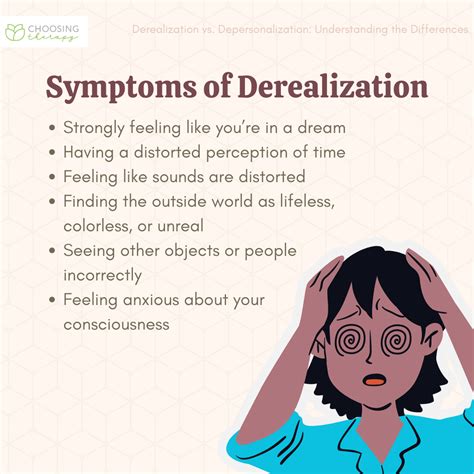Depersonalization Definition

Depersonalization is a fascinating yet complex phenomenon that has intrigued psychologists and researchers for decades. It refers to a state where individuals experience a sense of detachment or disconnection from their own thoughts, feelings, and body. This dissociative experience can be fleeting or prolonged, often leaving those affected feeling like an outside observer of their own life.
Understanding the Depersonalization Phenomenon

The term “depersonalization” was first introduced in the late 19th century by French psychiatrists to describe a group of symptoms characterized by feelings of unreality and estrangement. It is a core feature of Depersonalization-Derealization Disorder (DPDR), a recognized mental health condition in the Diagnostic and Statistical Manual of Mental Disorders (DSM-5).
Symptoms and Experiences
Individuals with depersonalization often describe a range of symptoms, including:
- A sense of being detached from one’s body, as if watching themselves from the outside.
- Emotional numbness or a lack of emotional response.
- Feelings of unreality or being disconnected from the world.
- Distorted perceptions of time, space, and self.
- Difficulty recognizing oneself in the mirror.
These experiences can vary in intensity and duration, with some individuals reporting brief episodes triggered by stress or trauma, while others may experience chronic and debilitating symptoms.
Causes and Risk Factors
The exact causes of depersonalization are not fully understood, but several factors are believed to contribute to its development. These include:
- Traumatic Events: Experiences such as physical or emotional abuse, accidents, or natural disasters can trigger depersonalization in some individuals.
- Chronic Stress: Prolonged periods of stress, whether related to work, relationships, or personal struggles, may lead to feelings of depersonalization.
- Neurobiological Factors: Some research suggests that imbalances in certain neurotransmitters, particularly serotonin and glutamate, may play a role in depersonalization.
- Genetics: There is evidence to suggest a genetic predisposition to depersonalization, with certain genetic variants linked to an increased risk.
Diagnosis and Treatment

Diagnosing depersonalization typically involves a comprehensive assessment by a mental health professional. This may include detailed interviews, psychological testing, and ruling out other potential causes such as substance use or medical conditions.
Therapeutic Approaches
The treatment for depersonalization often focuses on cognitive-behavioral therapy (CBT) and related approaches. These therapies aim to help individuals understand and manage their symptoms, reduce avoidance behaviors, and improve overall well-being. Techniques such as mindfulness, exposure therapy, and cognitive restructuring are commonly used.
Medication
While there is no specific medication for depersonalization, certain antidepressants and antianxiety medications may be prescribed to manage associated symptoms. These should always be used under the guidance of a healthcare professional.
The Impact of Depersonalization
Depersonalization can have a significant impact on an individual’s daily life and overall well-being. It may interfere with work, relationships, and personal goals, leading to social isolation and a decreased quality of life. Understanding and managing this condition is crucial for affected individuals to regain a sense of control and connection.
Personal Stories
John, a 32-year-old software engineer, shares his experience with depersonalization: “I felt like I was living in a dream, watching myself from afar. It was as if my body and mind were disconnected. I struggled to connect with my emotions and often felt like an observer in my own life. Therapy helped me understand and cope with these feelings, and I’m now able to manage them effectively.”
Research and Future Directions
Research into depersonalization is ongoing, with a focus on understanding the underlying neurobiological mechanisms and developing more targeted treatments. Recent studies have explored the use of virtual reality exposure therapy and neurofeedback as potential therapeutic approaches.
Emerging Treatment Options
One promising area of research is the use of transcranial magnetic stimulation (TMS), a non-invasive brain stimulation technique. Preliminary studies suggest that TMS may help reduce symptoms of depersonalization by modulating neural activity in specific brain regions. However, more research is needed to establish its effectiveness and safety.
| Treatment | Description |
|---|---|
| Cognitive-Behavioral Therapy (CBT) | A type of psychotherapy that focuses on identifying and changing negative thought patterns and behaviors. |
| Mindfulness-Based Therapies | Techniques that teach individuals to be present and non-judgmental, often used to manage dissociative symptoms. |
| Exposure Therapy | A gradual exposure to triggers or situations that provoke depersonalization, helping individuals learn to manage their reactions. |

FAQs

What is the difference between depersonalization and dissociation?
+Depersonalization is a specific type of dissociation, which is a broader term encompassing various experiences of detachment or disconnection. Dissociation can include feelings of depersonalization, derealization (a sense of unreality about the external world), and dissociative amnesia (memory loss). Depersonalization specifically refers to the sense of detachment from one’s own thoughts, feelings, and body.
Can depersonalization be triggered by stress or anxiety?
+Yes, depersonalization is often triggered by periods of high stress or anxiety. Stressful events or ongoing stressful situations can lead to feelings of detachment and unreality. However, it’s important to note that not everyone who experiences stress will develop depersonalization.
Is depersonalization a sign of a more serious mental health condition?
+Depersonalization can be a symptom of various mental health conditions, including depression, anxiety disorders, and post-traumatic stress disorder (PTSD). However, it can also occur as an isolated symptom without any underlying mental health disorder. A comprehensive evaluation by a mental health professional is necessary to determine the cause and appropriate treatment.


